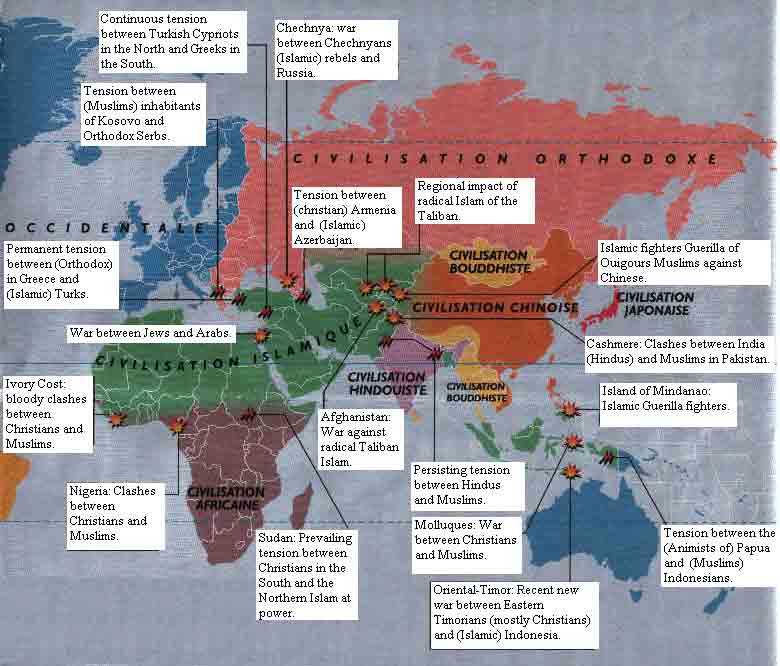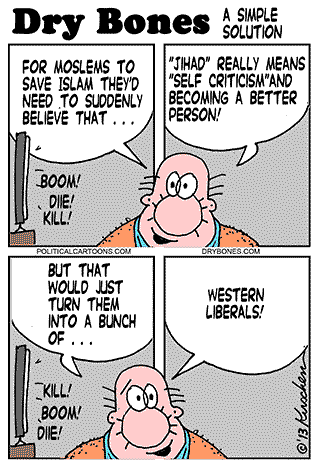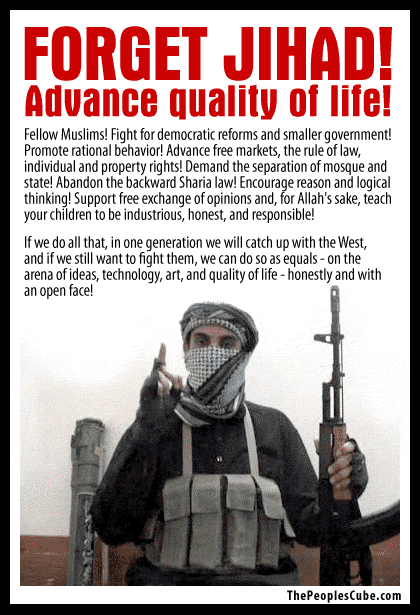
 | The Xenophile Historian |
THE HOLY BOOK OF UNIVERSAL TRUTHS,
K. U. P.
(Kimball's Unauthorized Perversion)
Let the record show that not all of the world's Moslems are terrorists, but more than 90 percent of 21st-century terrorists are Moslems. Fundamentalist Islam (also known as Islamism or Islamofascism) seems to be the primary motivator for war these days; as you can see on the map below, just about every zone of conflict in today's world, from the Balkans to the Middle East to Southeast Asia, has Moslems involved on one or both sides. Sometimes it seems like the rebels of the previous generation simply switched ideologies. The Philippines and Thailand, to give two examples, used to have a problem with communist guerillas; now they have a problem with Islamist guerillas.
In fact, it is easier to list the trouble spots where Islam isn't a factor. About the only ones I can think of right now are in Equatorial Africa and Colombia.

"If it's not the Crusades, it's the cartoons."--George W. Bush, at a 2006 press conference, commenting on how the Islamists are always upset about something.
Sometimes even those grievances are just excuses for awful behavior. Cases in point: the bombings of nightclubs on Bali, the Chechnyan attacks in Moscow and Beslan, the aforementioned riots in France, the bombings of hotels in Jordan and Egypt, and the gang-raping of non-Moslem women who stray into immigrant neighborhoods in Australia, Norway and Sweden. Few--if any--of the victims in those incidents were Americans or Jews; most of them didn't even come from countries that support the War on Terror. In 2006 there was a plot by seventeen Canadian Moslems to blow up a target in Toronto with ammonium nitrate, and behead any members of Parliament they could get their hands on, including the prime minister. What a bunch of ingrates! Keep in mind that Canada refused to join the US-led coalition in Iraq, and no Western nation, except possibly France, has shown more toleration for Islamists. All this suggests to me that Islamism not only encourages violence, but also stupidity.
A few days after the September 11 attacks, Miami Herald columnist Leonard Pitts wrote about what motivates terrorists to fly an airplane into a building, and concluded it was sheer hatred. Here's how he put it:
"Last week happened, pure and simple, because certain religious extremists hate us. They hate us because our foreign policy has been supportive of Israel. They hate us because we helped repel Saddam Hussein from Kuwait in 1991. But in the larger sense, they hate us because their children want blue jeans, Britney Spears videos and the chance to be like Mike. They hate us because we consume bacon and beer. They hate us because American women wear bikinis and speak their minds. They hate us because we are the biggest, the wealthiest, the most influential, the most powerful. They hate us because we are not them and, moreover, because they are not us. They hate us because they think the deity requires it. They hate us because."
Islam is by no means the only religion with militant followers; other religions have produced militants when emphasis was placed on the right scriptures. Christianity was often spread by the sword between 300 and 1700 A.D., and there were quite a few militant Jews in Biblical times. Militant Hinduism is a fact of life in modern India, as the 1992 destruction of the Ayodhya mosque showed us, and we have to remember that the most beloved Hindu scripture, the Bhagavad Gita, is a record of a battlefield conversation. There is even a militant form of Buddhism in Myanmar, promoted by the government, not by the monks; it has viciously persecuted that country's Moslem (Rohingya) community. As for those religions which are totally committed to peace, like the Baha'is and Quakers, they got that way because they rose up in response to state religions that had become overbearing.
What makes militant Islam different is that in today's "global village," most religions have learned some measure of tolerance. Not so Islam; Islamists find it a crying shame that in most of the world, Islam does not dominate every aspect of daily life. This has led to some short tempers. In 2000 the Palestinians celebrated gaining full control over the city of Nablus by desecrating the tomb of Joseph, and in 2002 Palestinian gunmen desecrated the Church of the Nativity in Bethlehem. In medieval times this would have been grounds to start a war, but today's Jews and Christians have a hard time even speaking out against these acts; the pope, for example, paid more attention to the pedophile priest scandal in the Catholic Church. Meanwhile in Afghanistan, the Taliban blew up the world's largest statues of Buddha; Sri Lanka offered to buy the Buddhas before the deed was carried out, and that was the limit of the Buddhist response. But oh! Publish a false story about a Koran being flushed down a toilet, or twelve editorial cartoons showing the prophet Mohammed, and much of Dar al-Islam goes up in flames!

A lot of my friends and relatives are inclined to say, "Everything I need to know about Islam I learned on September 11." Myself, I have read enough history to look beyond that; I know that before the Crusades, Islam was more tolerant than Christianity. However, Islamists seem to have forgotten that aspect of their heritage; they want to create a utopia resembling seventh-century Arabia, without realizing that Islam did best when Moslems tolerated members of other religions in their midst, and were willing to learn from them. Examples include the Abbasid Caliphate, tenth-century Spain, and the Ottoman Empire before it declined. Since those days, however, the Islamic contribution to humanity has been close to zero, and many Moslems seem to have a hard time accepting progress, when the inventions and discoveries are made by non-Moslems; as recently as the 1970s, for instance, Saudi Arabian schools were teaching that the world is flat.
When the Wahhabis and their Egyptian cousins, the Moslem Brotherhood, were the only groups promoting militant Islam, it had no effect on the world beyond the Middle East; no wonder Western leaders saw communism as a greater danger. That changed with the 1979 Iranian Revolution--now both Sunnis and Shiites had a radical faction. With the help of modern communications, they succeeded in spreading their malignant creed faster and more effectively than similar movements (e.g., the Fatimids, the Almohads, the Moguls under Aurangzeb, the Mahdists, the Sanussi) had done in the past. This constituted a threat to traditional Islam as well as to non-Moslems. As Fareed Zakaria explained in The Future of Freedom, most Moslems had previously "practiced a kind of village Islam that adapted itself to local cultures and to normal human desires. Pluralistic and tolerant, these villages often worshipped saints, went to shrines, sang religious hymns and cherished art--all technically disallowed in Islam." African, Turkish, Persian, Indian and Southeast Asian Moslems were not willing to completely give up their pre-Islamic heritage, so they left some elements of the old culture intact, but when the Arab, more "universalist" interpretation of the Koran took over, anything not approved by the Koran was plowed under. Zakaria called this "Islam of the high church as opposed to Islam of the street fair."
In recent years, protestors have staged noisy demonstrations at meetings of organizations that promote international commerce, like the World Trade Organization, charging that globalization is a threat to the world's indigenous cultures. Let the record show that Western-style globalization imposes modern technology and capitalism, but it also allows indigenous cultures to keep much of their way of life. For example, traditional music and dances have survived on Bali, because foreign tourists will pay good money to see them. However, the globalization promoted by Riyadh and Tehran is less tolerant of local customs. We see it in the Sudan, where the Islamist, Arab government of Khartoum is waging a war of extermination against the non-Arab, less fundamentalist Moslems of Darfur, while in Iran, the government is building a dam that will flood the valley containing Pasargadae, the home town and tomb of Cyrus the Great. In the past Cyrus was a source of pride to Iranians, but now it seems that today's ayatollahs want to erase the legacy of the first king who was tolerant of all nationalities and religions, including Judaism.
Okay, if fundamentalist Islam, financed by oil revenues, is the root cause of today's terrorism, what is the solution? In the long run I expect it will take the coming of the Messiah to bring a permanent peace. In the short run, some form of Islamic reformation would seem like the answer, because a rational interpretation of scripture defused the militant tendencies in other religions. Islam has had such movements in the past, but usually they failed and disappeared, like the Mu'tazilites. If they survived, they added new religions to the world scene (e.g., the Druze and Baha'is), while leaving most of Islam untouched.

I have also heard the suggestion that Sufism ought to be promoted more vigorously in the Moslem world. On first glance, that has a better chance of success, because most Sufi sects oppose violence and they can live among non-Sufi Moslems with little fear of persecution; only the Wahhabis reject Sufism completely. The problem is that Sufism is by its very nature a splintering movement, as Protestantism has been for Christianity. It's hard to make any general statements about a group as diverse as the Sufis, but most claim to have special knowledge unavailable to outsiders, and many combine Islam with local customs/beliefs from the pre-Islamic era; those characteristics tend to divide people, rather than unite them. For a Sufi solution to work, you would need at least one Sufi sect for every country where Islam is widely practiced, and maybe one for every ethnic group; good luck on getting them to work together!
Unfortunately, reformations usually don't come peacefully. If you've read my history papers, you know that Jews stopped getting involved in politics for 1,800 years when the Romans decimated them (the Jewish-Roman War and the Bar Kochba Rebellion), and it took the Thirty Years War to make Christians stop killing each other in the name of God. With modern-day warfare being a ghastly catastrophe for everyone caught in it, millions are likely to die if an Islamic reformation comes about by force (e.g., see the fate of the Palestinians). A peaceful reformation will only happen if the so-called "Islamic moderates" speak out more often, against those who give their religion a bad name.
So far about the only moderate Moslem voices I have heard are those of Irshad Manji, Sheikh Abdul Hadi Palazzi, and Azhar Usman. In September 2006 (five years after the September 11 attacks), UPI reported that Pakistan's Tahirul Qadri had become "the first prominent Muslim scholar to condemn Osama bin Laden and the Taliban so strongly in public." The most important Moslem to speak out on this issue is Egyptian President Abdel Fattah el-Sisi.
If most Moslems do not agree with the extremists, then their response (or lack of it) is astonishing; have they really been silenced by threats from a few? Compare it with the response in the 1980s and early 90s, when a handful of Christian extremists were bombing abortion clinics and shooting the doctors; other Christians denounced them nearly as strongly as everybody else did. As long as moderate Moslems are silent, they will be as elusive as the jackalope, which supposedly lives in Wyoming, but won't show itself when people look for it. Thus, non-Moslems will wonder if the moderate majority even exists, and assume that the militants speak for Moslems everywhere. All things considered, it would be better for everyone if Islam reforms itself, rather than wait until the Kaffirs (infidels) impose reform on Islam.
"The moment has not come, but it is around the corner, when non-Muslims will reasonably demand to have evidence the Muslim faith can operate within boundaries in which Christians and Jews (and many non-believers) live and work."--William F. Buckley, October 2005.
(Update: It looks like it's starting to happen. A blogger called the "Anti-Mullah" has proposed a constitutional amendment banning Islam. I don't think it will go very far in our politcally correct society, but click here to check it out.)
A few years ago a joke asked why you routinely see Asians, blacks, Europeans and Russians on Star Trek, but not once have we seen a Moslem character. The answer? Because the show is set in the future! This suggests to me that Star Trek's scriptwriters can't imagine a Moslem country with a successful space program. Heck, I remember when a Filipina actress appeared on the show, so even my wife's people are represented there. While we cannot call Star Trek an accurate portrayal of the future (this funny essay from the creator of "Dilbert" explains why), it shows what people think the future will be like.

You've probably heard the saying that "those who ignore history are doomed to repeat it." That may even be the reason why you're on this website. As a history major, I probably shouldn't disagree, but there are those who make the opposite mistake, by becoming obsessed with one part of history. The Islamists are in the latter category, due to their preoccupation with the events covered in Chapter 9 of my Middle Eastern history. Their efforts to bring back the past may very well deny them a future.

Support this site!